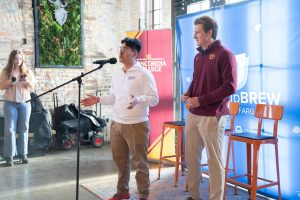Concordia’s nationally-ranked speech team continues to excel in competitions while exploring important topics that have yet to hit the newsstands.
Speech students search day after day for interesting, compelling topics. As they put their developing skills to use, they often uncover and speak about things happening in the world that hit national news long after.
It seems to be working to the students’ advantages – Concordia’s speech team has taken impressive fourth and second place finishes in recent tournaments. The team has also been ranked in the top 20 at the national level for many years. That success begins with the hard, careful work speakers put in behind the scenes.
Assistant Director of Forensics Megan Orcholski said the team of speakers thrives in the progressive space residing in the speech program. She has seen many speeches surrounding topics that hadn’t been in the news spotlight, only to see the news appear on a large scale months if not years later.
“I saw a speech probably my senior year of college, so this is like 2005 – almost 10 years ago – about how the bees were disappearing,” Orcholski said. “Now everyone’s like ‘The bees are disappearing!’”
She said with the researching and synthesizing skills that speech students possess, cultivating and discovering news before it actually becomes big in the world is a fairly regular occurrence.
“My speech kids are usually two weeks ahead of everyone,” Orcholski said. “We totally dig finding stuff.”
Speech is something that helps develop those skills to stay ahead in the news world. As senior speech member Catherine Bruns said, it’s vitally important for speakers to be up to date on current events. She herself found that as she researched and chose the water shutoffs in Detroit as her Program Oral Interpretation event speech.
“If you’re giving a speech about why certain topics and implications are so important,” Bruns said. “You need to be the first one to hear about it.”
Researching to stay up to date on current events is key to being successful in a vast majority of the events in speech. Bruns, a third-year competitor, said staying caught up is especially important in the Extemporaneous Speaking category. This event, as defined by the American Forensic Association, is one in which contestants are given three topics in relation to a current event, and the speakers choose one and prepare a speech in 30 minutes. It’s no surprise that extemporaneous speakers, or “extempers,” have to stay up-to-date with their news reading.
“I’ve got extempers that it is everyday routine to read CNN,” Orcholski said. “The Huffington Post is relaxing. ‘Salon.com’ is positively a vacation.”
The Informative event also calls for new, relevant news and issues in the world. With most speech students involved in multiple differing events, all research and synthesis must be well-executed. As Orcholski also said, all of the coaches help to teach students how to be cutting-edge researchers with the skills to read at high levels and synthesize information.
First-year speech member Savannah Johnson said she has already recognized instances in which those skills in researching have come into play in uncovering big news.
“In the first week of speech there was a girl talking about Ebola, and I didn’t really know much about Ebola at that time,” Johnson said. “Now here Ebola is this huge world crisis that we’re facing.”
The research practice begins during the speech orientation week in August when speech members arrive on campus a week before other students move in. The team gets a head start on the season by refreshing research and speech-writing skills.
Bruns said that during the week the speech team spends on campus, coaches help their students find ways to get their own research and go through how to synthesize what they find.
Research goes on throughout the season, but it’s important to get a good start for first-year members. Johnson said that there’s a great focus on researching to develop strong arguments with a good organizational structure.
Those specific skills go even further than speech. They come into play in classes and outside college altogether. With both academics so closely related with the co-curricular speech program, skills very often spill over into the classes, benefiting the students in their academic work.
“Really with any speaking and research or writing in any other class, the skills I’ve learned through the speech team have been tremendously helpful,” Johnson said.
Bruns said she has found those skills helpful in other classes as well.
“(Speech) teaches you the right way to look at situations, the right way to present things and be more comfortable – and relate to your audience,” she said.
Though the coaches have a lot to do in helping grow the drive in their students for researching and making choices, students are the ones who begin to branch off from the knowledge their coaches offer. Orcholski knows that students thrive with the opportunity to make their own decisions.
“We try very very hard on this team to balance individual agency with competitive excellence,” she said. “I often say to parents and students that I’m recruiting that we engage in that struggle – and it is a struggle.”
Staying on top of the news and sharing it during competitions is just one way the speech team is making an impact on the world around them. In order to get that news as it comes out, speakers count on their skills. As Orcholski said, the activity of speech itself promotes critical thinking, the attaining of knowledge, and the understanding of sources and perspectives. The skills her students are using show her how capable they really are.
“It’s called communication analysis. It’s where you take an active communication and you apply a method,” she said. “We use it in [communication] studies as a form of research.”
Beyond that, Orcholski continues to be astounded at the level at which members of the Concordia Speech Team do those analyses. She knows how ahead of the game they really are.
“Getting an 18 or 19-year-old to do a version of what people in my field are publishing is a pretty cool thing.”
This article was submitted by Ellie Boeson, contributing writer.





Be First to Comment